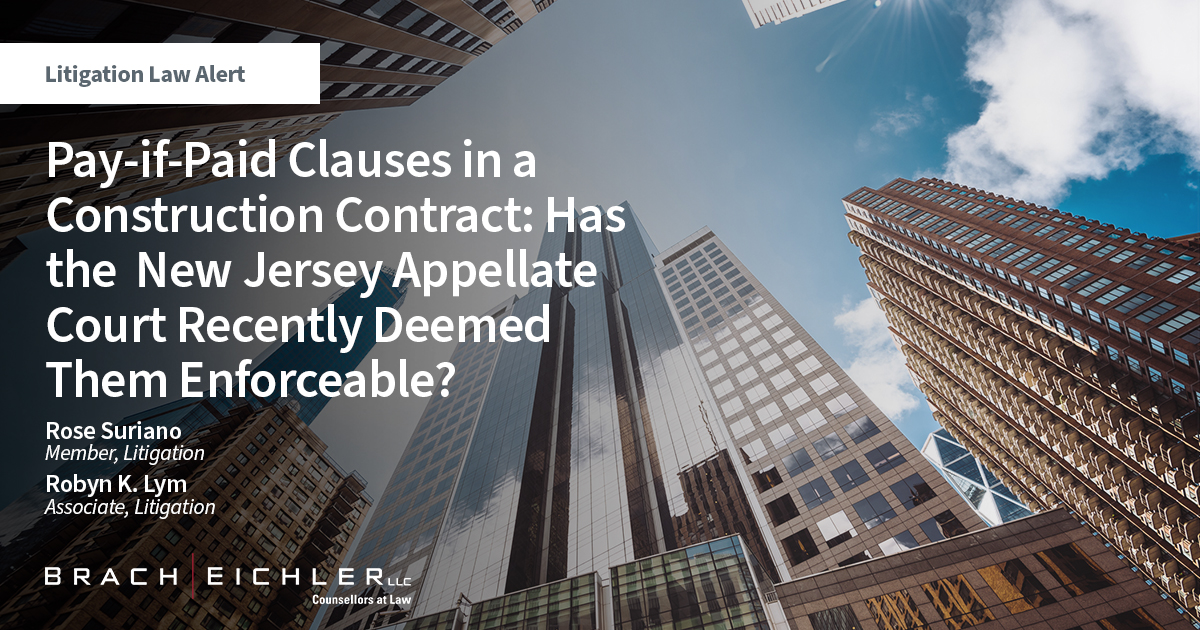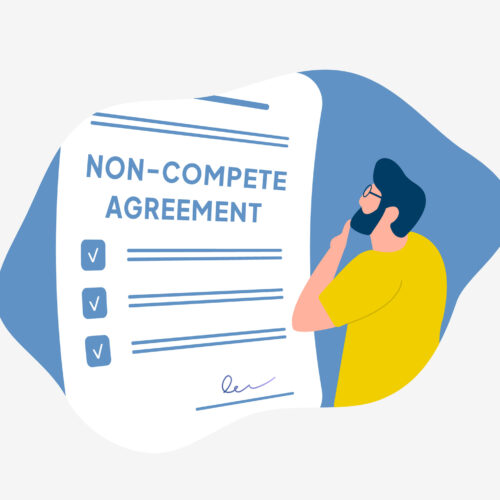Pay-if-Paid Clauses in a Construction Contract: Has the New Jersey Appellate Court Recently Deemed Them Enforceable?

A “pay-if-paid” clause is common in construction industry subcontracts. The purpose of a pay-if-paid clause is to condition the general contractor’s obligation to pay a subcontractor on the general contractor’s receipt of payment from the owner. If the general contractor does not receive payment from the owner, the general contractor (or its surety) does not have a legal obligation to pay the subcontractor, if the subcontract contains a pay-if-paid clause. Whether a pay-if-paid clause is enforceable varies from state to state and a subcontractor will need to consult with that state’s laws.
In New Jersey, prior to the recent New Jersey Appellate Division decision in JPC Merger Sub LLC v. Tricon Enterprises, Inc., 2022 WL 17479912 (App. Div. Dec. 7, 2022), the courts had never addressed whether a pay-if-paid clause is enforceable. In JPC Merger Sub, LLC, Tricon, the general contractor, sent a purchase order to JPC, the subcontractor, for work on a public project for Union County. The purchase order had pay-if-paid language in it, stating that “[JPC] understands and agrees that Tricon’s obligation to make any payment to Vendor is subject to, and shall not exist unless and until, Tricon’s receipt of payment on account of Vendor’s [w]ork from the Owner” and that “the occurrence and satisfaction of which shall be a condition precedent to Tricon’s duty to remit payment.” The pay-if-paid provision in the purchase order also stated that Tricon would pay within 14-days of receiving payment from the County.
JPC’s president made several handwritten changes to the purchase order, including reducing the time for Tricon to pay after receiving payment from the County from 14 days to 7 days, but the pay-if-paid language remained in the purchase order which was signed by both parties.
JPC began its scope of work. Tricon paid the first two invoices, but refused to pay the remaining invoices because the County did not pay Tricon for JPC’s work due to a dispute between Tricon and the County as to who was to make arrangements with the utility company to allow work to proceed.
Since Tricon did not pay JPC, JPC submitted a claim to Tricon’s bond company for payment. Because Tricon took the position that payment was not due because of the pay-if-paid language, the bond company also refused payment. JPC then filed a lawsuit against Tricon and the bond company. Tricon and the bond company filed a motion for summary judgment based on the pay-if-paid clause, and the court dismissed JPC’s lawsuit, finding that the pay-if-paid clause was valid and enforceable. JPC then appealed.
On appeal, the Appellate Division addressed the enforceability of pay-if-paid provisions. The appellate court concluded that New Jersey recognizes that parties to a contract are free to negotiate and include clauses as they see fit. Thus, the appellate court held that as long as the contract contains “clear and unambiguous” language that the intent is to condition the general contractor’s payment on receiving payment from the owner, pay-if-paid provisions are enforceable. However, the court cautioned that the general contractor’s conduct or actions may defeat a pay-if-paid clause. That is, if the general contractor’s actions and inactions are a cause of the owner not paying the general contractor, a general contractor cannot rely on the pay-if-paid clause to deny a subcontractor payment. Thus, although the Appellate Division acknowledged the enforceability of a pay-if-paid clause, it reversed the lower court’s dismissal of JPC’s claims because the court found there was a factual dispute as to whether Tricon’s actions or conduct caused the County not to pay, and, if so, this could make Tricon responsible for payment regardless of whether the County paid.
Based on the Appellate Division’s decision in JPC Merger Sub, there is now greater clarity in New Jersey that if a pay-if-paid clause is to be enforced, it must be clear and unambiguous and the general contractor must not be responsible for the owner’s failure to make payment. Therefore, general contractors can now rely on pay-if-paid clauses to a greater extent. Subcontractors must carefully review the payment clauses of their subcontracts to determine if payment to the subcontractor is conditioned on payment to the general contractor, because based on the JPC Merger Sub LLC v. Tricon Enterprises, Inc., courts will enforce these clauses.
Even the most sophisticated contractors need assistance navigating through the changes in contract language. Should you have any questions about this decision and revisions that should be made to your contracts, feel free to contact:
Rose A. Suriano, Esq., Member, Litigation Practice, at rsuriano@bracheichler.com or 973-403-3129
Robyn K. Lym, Esq., Associate, Litigation Practice, at rlym@bracheichler.com or 973-403-3124
About Brach Eichler LLC
Brach Eichler LLC, is a full-service law firm based in Roseland, NJ. With over 80 attorneys, the firm is focused in the following practice areas: Healthcare Law; Real Estate; Litigation; Trusts and Estates; Corporate Transactions & Financial Services; Personal Injury; Criminal Defense and Government Investigations; Labor and Employment; Environmental and Land Use; Family Law; Patent, Intellectual Property & Information Technology; Real Estate Tax Appeals; Tax; and Cannabis Law. Brach Eichler attorneys have been recognized by clients and peers alike in The Best Lawyers in America©, Chambers USA, and New Jersey Super Lawyers. For more information, visit www.bracheichler.com.
This alert is intended for informational and discussion purposes only. The information contained in this alert is not intended to provide, and does not constitute legal advice or establish the attorney/client relationship by way of any information contained herein. Brach Eichler LLC does not guarantee the accuracy, completeness, usefulness or adequacy of any information contained herein. Readers are advised to consult with a qualified attorney concerning the specifics of a particular situation.













